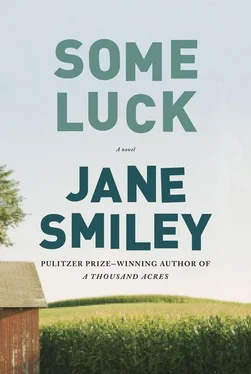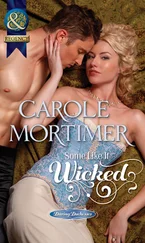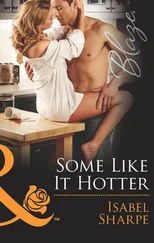“How?”
“Well, in England things are really unfair, and have been for centuries, and if a person tries to better himself, he really can’t, because the system won’t allow it; but in America things that are unfair are more changeable, because they’ve only been unfair for, say, seventy or eighty years, and so — well, and also, the country is so big that if things are unfair in, say, Virginia, you can go to Texas or California and try it there.”
“I would go to Chicago.”
Eloise, looking just like the image of Chicago that Frank always thought of, in her smooth black dress and short hair that was waved and pressed against her head, patted him on the cheek and said, “I keep waiting for you.”
“Are things unfair in Chicago?”
“Well, Julius and I talk about that every day. Let’s say that they are less unfair than they are in England, and Julius likes it because he can live there and do what he wants, but it’s pretty wild. There are gangsters, you know. But if they repeal Prohibition, I think things will calm down there.”
“Are things unfair here?”
“Nothing is unfair here but the weather. However, the weather is pretty unfair lately.”
This, Frank knew, was true. He looked at Eloise for a moment, then said, “Can I kiss you good night?”
“Sure.” She offered her cheek, and he bent toward her, but her smell was so good that he ended up kissing her on the lips. She pushed him away and said, “Oh, Frankie. Goodness. What is Rosanna going to do with you?”

THE CORN HARVEST WASN’T over yet, but anyway Papa put Joey and Frank in the car and left in the middle of the afternoon. He drove them a hundred miles, to a town called Centerville. Joey fell asleep in the car and then was cranky, but they both woke up pretty good when they saw how many people were gathered to listen to a man who was named Christian Ramseyer and was a congressman, though not “our” congressman — too bad for us, according to Papa.
Frank and Joey ran around in the crowd while Papa talked to other farmers they saw. Everyone was dressed in work clothes, not like when you went to church, but when Mama said she wanted the boys to dress properly, Papa said they were making a statement. “Don’t make it too loudly” was what Mama said, and then they left.
The farms all the way over looked just like the farms around Denby, but they did drive through Ames and look at the buildings at Iowa State College, where Eloise had learned to be a communist, according to Papa. When Frank said that Eloise said she wasn’t a communist, Papa said, “Well, why did she marry that Red Jew, then?” and Frank still hadn’t figured out what he was talking about. Anyway, no one was invited to the wedding, and they didn’t have a honeymoon.
After everyone ran around for a while, and ate some sausages and corn on the cob, they all went into a building (so many that they were spilling out) and listened to Representative Ramseyer talk about how he was going to save the farmers, and Frank liked what he heard. Representative Ramseyer was older than Papa, but he shouted like a preacher, except that everyone shouted along with him: “We want an honest dollar!”
“Yes!”
“A stabilized dollar is an honest dollar.”
“Yes!”
“Farmers will be able to pay their debts!”
“Yeah! Yeah!”
“And buy a few things for their families! Like shoes!”
“Yay! Yes!”
“People would be able to find jobs!”
“Yes!”
“And the banks would stand instead of collapsing! The solution to our difficulties is a simple one, though not easy. But I am working for you!”
“Yes! Yes!”
All the men and boys roared and jumped. Frank thought it was a little like that Billy Sunday time, but not as scary, and on the way home, Papa was as happy as Frank had seen him in months, telling Frank and Joey all about how America worked and communism did not, and that much was clear to every farmer, every hick, every Hoosier, even if it wasn’t to big-city types like Julius whatever-his-name-was.
Joey fell asleep, and Frank believed Papa.
But even so, a few weeks later, he heard Papa say to Mama that he only got thirty bushels per acre this year, and he didn’t know what they were going to do.

PAPA HAD five Southdown ewes now (“And I don’t know why I have those”), and then Grandpa Wilmer gave Frankie and Joe each a newborn lamb from his Cheviot flock for a 4-H project.
Joe said, “Can I name him?”
“I guess so, if it’s 4-H. Is Frankie naming his?”
“Patsy,” said Joe.
Papa laughed, though Joe didn’t know why, and then said, “Well, what about yours?”
“I want to name him Fred.”
Papa said that was okay.
The lambs, of course, had not been weaned, so Grandpa Wilmer brought two ewes and two lambs over in the back of his new truck the next day. The new animals had bare faces, which made them look strange, but Joe liked that, too — their faces looked framed by the wool on their necks. Papa put the ewes and the lambs in their own pen, and Frankie and Joe fed them. Joe saw within about a day that Frank was going to leave most of the work to him, but he didn’t mind. Every morning, before sunup, he got out of bed and put on his clothes and walked through the dark house, out the back door, through the snow, to the sheep pen, where the two ewes and two lambs greeted him and he greeted them—“Good morning, Fred. Good morning, Pat, you look perfect today.” The ewes seemed happy to have the feed trough all to themselves. They would go back to Grandpa Wilmer’s after the lambs were weaned. Joe knew to touch the ewes before he touched the lambs, so he did that for a few days. Since they were Cheviots, he touched them on their faces, and they actually seemed to like it. With Southdowns, you could touch them anywhere, but their wool was so thick you had to wonder if they even knew you were in the neighborhood.
On a Saturday after Valentine’s Day, when the lambs (and Papa’s five lambs, too) were between two and three weeks old, Papa said over breakfast, “Well, 4-H-ers, today’s the day.” Joe’s heart sank, but Frankie bounced in his chair.
Joey didn’t like castrating the lambs and docking their tails when they were only two or three weeks old, but Papa said that he would like the screwworms a lot less — a lamb couldn’t feel, or could hardly feel, when his tail was docked, but if and when the screwworm got in there, the lamb could feel it plenty, and it hurt him very much, even if he could be saved, and some could not.
Papa said, “You know, out west, they fry up lambs’ testicles and eat them.”
From the stove, Mama exclaimed, “Walter! Goodness!”
“Well, the Germans do that, too, and I’m sure the Cheeks and the Chicks have tasted their share. Shall we save some for supper?”
“Some what?” said Lillian, looking up inquisitively.
“Go, go!” said Rosanna, and she shooed them out the door.
The lambs’ tails were pretty long — Patsy’s came to below his hocks, and Fred’s was almost that long.
Papa built a fire in the smithing area beside the barn and set two irons into it. His knives (he had two of them) were already sharpened.
Papa and Frankie herded the seven lambs into the pen, while Joe guarded the ewes in the barn. It was hard to tell who was making more of a racket. Once everyone was separated, Papa started running. Frankie’s job was to catch a lamb, throw a rope around its neck, and drag it to Papa. Papa ran to him and helped him; then, at the smithing area, he laid it on its side, and if it was a male, cut into the scrotum, and squeezed out the testicles. By now it was really squealing, but then Papa cut the tail and set the hot iron on it. When it jumped up, Joe’s job was to run over, grab the rope, guide it toward the barn, open the door, and push the lamb inside without letting any ewes out. By this time, Papa was running back to Frankie.
Читать дальше














